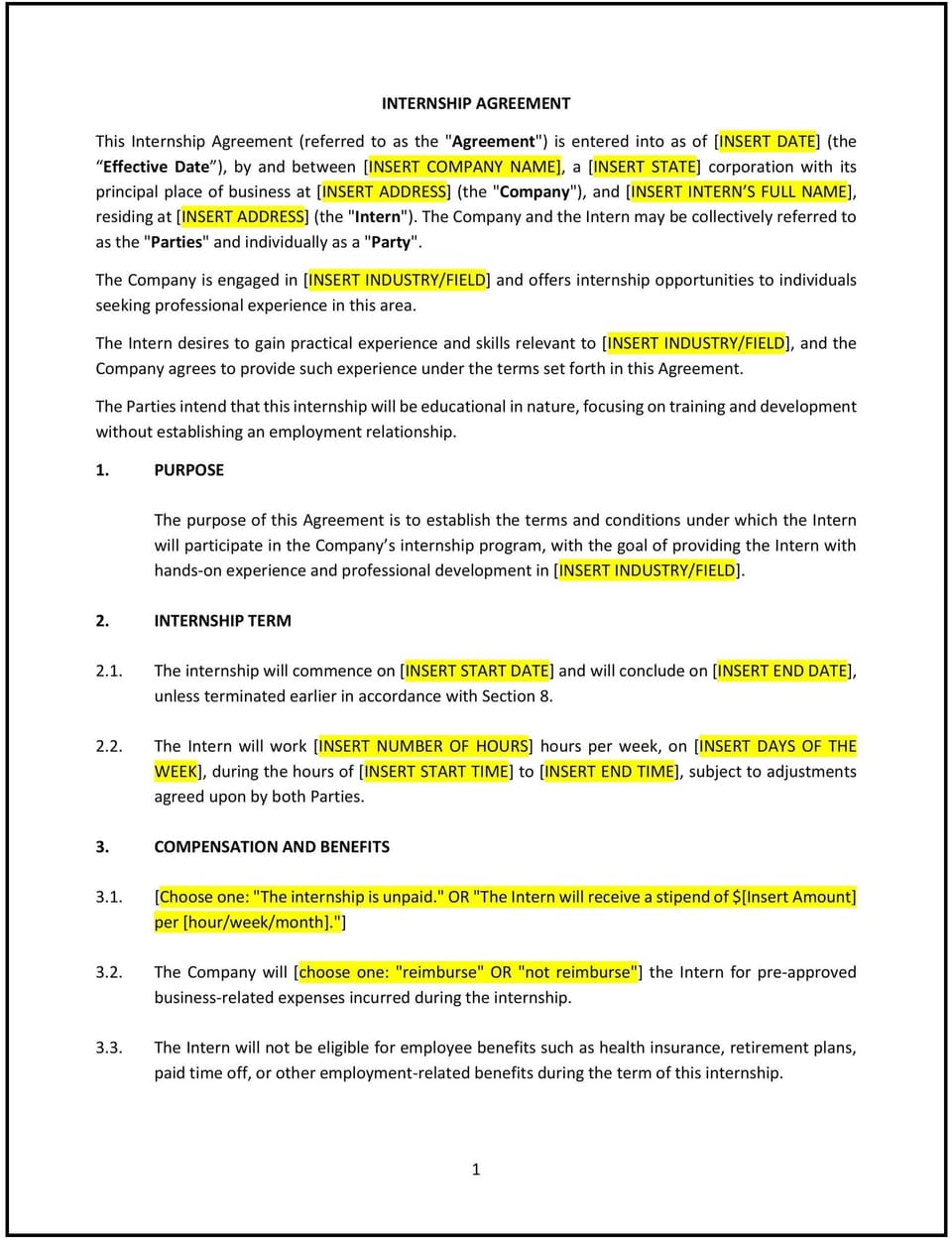Internship Agreement (Texas): Free template

Internship Agreement (Texas)
An Internship Agreement is a legal document that outlines the terms and conditions of an internship between an intern (the Participant) and a company or organization (the Host). In Texas, these agreements are governed by state labor laws and must align with federal regulations, including those set by the U.S. Department of Labor. A well-drafted Internship Agreement clarifies roles, responsibilities, compensation (if applicable), and adheres to Texas’s requirements.
For example, a Houston-based energy company might hire an intern from the University of Texas to assist with data analysis. A clear Internship Agreement helps define expectations, protect both parties’ rights, and meet Texas’s standards.
Tips for drafting and maintaining an Internship Agreement in Texas
- Identify the parties involved: Clearly specify the names, addresses, and roles of the Host organization and the intern.
- Example: “This Internship Agreement is entered into by [Host Organization Name], located at [Address], and [Intern Name], residing at [Address].”
- Define the purpose of the internship: Describe the goals and objectives of the internship program.
- Example: “The purpose of this internship is to provide [Intern Name] with hands-on experience in energy analytics, including data collection, modeling, and report writing.”
- Specify the duration and schedule: Outline the start and end dates of the internship, as well as the expected hours of work per week.
- Example: “The internship will commence on [Start Date] and conclude on [End Date]. The intern is expected to work 20 hours per week, Monday through Friday, between 8:00 AM and 4:00 PM.”
- Clarify compensation (if applicable): State whether the internship is paid or unpaid and include details about stipends, reimbursements, or academic credit.
- Example: “This internship is paid, with the intern receiving $15 per hour, payable bi-weekly.”
- Outline roles and responsibilities: Clearly define the tasks and duties the intern will perform during the internship.
- Example: “The intern will assist with analyzing energy data, preparing reports, attending team meetings, and supporting project implementation.”
- Include confidentiality and intellectual property clauses: Protect sensitive information and clarify ownership of any work created during the internship.
- Example: “The intern agrees to maintain the confidentiality of all proprietary information disclosed during the internship and assigns all intellectual property rights to the Host Organization.”
- Address termination terms: Specify the conditions under which the internship may be terminated by either party.
- Example: “Either party may terminate this agreement with a written notice of 7 days if the other party breaches any terms of this agreement.”
- Outline governing law and jurisdiction: Ensure the agreement specifies that it is governed by Texas law and identifies the appropriate courts for dispute resolution.
- Example: “This agreement is governed by the laws of the State of Texas. Any disputes arising under this agreement shall be resolved in the courts of [County], Texas.”
- Include signatures: Both the Host and the intern must sign and date the agreement to make it legally binding.
- Example: “IN WITNESS WHEREOF, the parties have executed this Internship Agreement as of the date first written above.”
Frequently asked questions (FAQs)
Q: What makes an Internship Agreement valid in Texas?
A: A valid Internship Agreement must clearly outline the terms of the internship, be signed by both parties, and comply with state and federal labor laws.
Q: Are unpaid internships allowed in Texas?
A: Yes, but they must meet specific criteria, such as providing educational benefits and not displacing regular employees.
Q: What happens if the Host Organization fails to honor the agreement in Texas?
A: The intern may seek remedies such as compensation or other legal actions as specified in the agreement or under state law.
Q: Is a written Internship Agreement necessary in Texas?
A: While not always legally required, a written agreement is strongly recommended to avoid misunderstandings and ensure clarity.
Q: How can I ensure fairness in an internship program in Texas?
A: Provide meaningful learning opportunities, clearly define expectations, and ensure compliance with state and federal labor laws.
This article contains general legal information and does not contain legal advice. Cobrief is not a law firm or a substitute for an attorney or law firm. The law is complex and changes often. For legal advice, please ask a lawyer.


